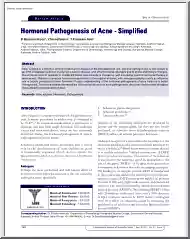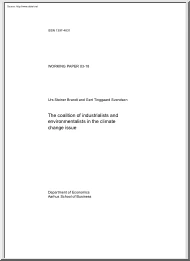No comments yet. You can be the first!
What did others read after this?
Content extract
Source: http://www.doksinet CLASSROOM CRISIS: Tough talk about Mickey Mouse schools By RALPH CASSELL:Asahi Shimbun News Service `I would take the education ministry out of the higher-education system. BRIAN J. MCVEIGH Professor at Tokyo Jogakkan College Common sense suggests that Brian J. McVeigh would applaud an educational system that has rewarded him with the chair of the cultural and womens studies department at Tokyo Jogakkan College, but that is not the case. ``How can a society recognized for its high standards of basic education tolerate a malfunctioning higher education system? he asked his audience at the Foreign Correspondents Club of Japan in Tokyo on May 12. To justify use of the term ``malfunctioning, McVeigh cited various problems: ``indolent students, poor administration, substandard universities and state interference, [which] exist everywhere. He also quoted descriptions used by Japanese educators to describe their countrys institutes of higher
learning-``playgrounds, kindergartens for adults, Mickey Mouse schools. Source: http://www.doksinet McVeigh has spent 15 years in 10 institutions here as a student, researcher and professor, experience he described most recently in ``Japanese Higher Education as Myth (M.E Sharpe, $2695) Fifteen months after that book was published, the Princeton Ph.D remains pessimistic, critical of the current call for more integration of universities into corporate culture. Indeed, McVeigh sees the university-business tie-up as the crux of Japans higher-education crisis. ``What happens is, other purposes, other noneconomic missions of education, get pushed aside and forgotten. I think that is what we see in Japan The result can be economism, ``the tendency to view a society in purely economic terms . Economism views education as merely a stepping stone toward employment. This indicates a lack of understanding that ideally the value of higher education has been its avocational, nonprofessional and
constructively critical spirit. An economistic view often does not appreciate the critical [role] higher education has performed as societys conscience and watchdog. McVeigh sees a connection between the present political malaise and the sorry state of Japans universities. ``Higher education has an important role in the political life of a nation. It acts as Source: http://www.doksinet the radical critique of the established political order. What is remarkable about Japan is that despite massive and incessant scandals, the same political players reappear on the scene. For comparative purposes, consider Italy, where not too long ago national elections after widespread scandals saw the electorate throw the scoundrels out. Why [has there been] no popular revolt in Japan after so many scandals? You might suggest that a lack of a solid higher-education training does not adequately politicize the populace. According to McVeigh, the problem began in the boom days when Japan was the envy
of the rest of the world. ``I think beginning probably in the 60s and 70s, when Japans economy started to take off, the negative effect was that everybody wanted to go to high school and university. But in order to do that, you had to come up with a mechanism, and that mechanism was exams. Unfortunately, the exams are not testing real knowledge. The exams are in a sense anti-educational As others have noted, McVeigh stressed that the preoccupation with examinations has doomed the teaching of English in this country, which, given the massive amount of effort expended and money spent, must be labeled a failure. The teaching of English here, McVeigh insisted, is not the teaching of Source: http://www.doksinet language but something he calls ``Japan-appropriated English. ``Japan-appropriated English simply means that in Japan, English education is not English education. Whats being taught is a type of non-English a dialect of English to take examinations. Japanese students by the
time they enter daigaku (college) have had six or seven years of English. Their heads unfortunately have been filled with bad habits . bad learning skills they are confused about what English is . [thinking] you can only learn English from a white person, that to communicate in English you must have perfect pronunciation, you must have perfect grammar. They also associate English with traveling overseas, going to Hawaii. They basically associate English with all these ideals and ideas that have little to do with communication. The examination system, however, is not the sole obstacle preventing most Japanese from acquiring basic communication skills in English: ``Japan-appropriated English is used . to build national identity It does that in a very strange way [related] to the nihonjin-gaijin (Japanese-foreigner) distinction. It seems to me that English, in a very clever way, is used to do that. English becomes the knowledge that only the `other can have, that only gaijin can have.
Japanese students are being told `Please learn about the Source: http://www.doksinet `other and internationalize-but dont really become internationalized. They are being sent this mixed message. A good percentage of the 50 or so audience members were fellow educators, whose comments suggested they endorse McVeighs bleak evaluation of university education here. A high school English teacher noted that many of McVeighs criticisms apply equally to secondary education. A university English teacher claimed that many Japanese colleagues teach English they themselves like (Shakespeare), not English that students need. More than one audience member asked McVeigh for suggestions to improve tertiary education. ``If I had the power, I would take the education ministry out of the higher-education system . If they want to guide pretertiary education, OK Maybe they do a better job there. But certainly they do a terrible job [at the university level]. They get in the way I would also say that
the examination system has to be changed or dismantled. McVeighs revision of Japans university system would also require a fundamental rethinking of its purpose. ``At the higher-educational level, a good education is not aimed at getting you a job . a good education should be along the lines of what in the US we used to Source: http://www.doksinet call liberal arts . where you are given a sampler of different types of knowledge. That type of education is good [because] it teaches you how to learn, so when you move between different jobs or companies or different countries, you will be able to be flexible, to adapt to a new environment. The present in particular demands such flexibility, McVeigh argued. ``Lifelong learning is a necessity in societies witnessing rapid social and technological changes. Japans tertiary education system, however, seems immune to change. In his presentation, McVeigh quoted Michio Nagai, a former education minister: ``The fact is Japan suffers both from
a lack of conceptual clarity about the nature and purposes of the university and from the hollow character of the education it offers. Nagai made that grim observation 32 years ago.(IHT/Asahi: May 31,2003) (05/31)
learning-``playgrounds, kindergartens for adults, Mickey Mouse schools. Source: http://www.doksinet McVeigh has spent 15 years in 10 institutions here as a student, researcher and professor, experience he described most recently in ``Japanese Higher Education as Myth (M.E Sharpe, $2695) Fifteen months after that book was published, the Princeton Ph.D remains pessimistic, critical of the current call for more integration of universities into corporate culture. Indeed, McVeigh sees the university-business tie-up as the crux of Japans higher-education crisis. ``What happens is, other purposes, other noneconomic missions of education, get pushed aside and forgotten. I think that is what we see in Japan The result can be economism, ``the tendency to view a society in purely economic terms . Economism views education as merely a stepping stone toward employment. This indicates a lack of understanding that ideally the value of higher education has been its avocational, nonprofessional and
constructively critical spirit. An economistic view often does not appreciate the critical [role] higher education has performed as societys conscience and watchdog. McVeigh sees a connection between the present political malaise and the sorry state of Japans universities. ``Higher education has an important role in the political life of a nation. It acts as Source: http://www.doksinet the radical critique of the established political order. What is remarkable about Japan is that despite massive and incessant scandals, the same political players reappear on the scene. For comparative purposes, consider Italy, where not too long ago national elections after widespread scandals saw the electorate throw the scoundrels out. Why [has there been] no popular revolt in Japan after so many scandals? You might suggest that a lack of a solid higher-education training does not adequately politicize the populace. According to McVeigh, the problem began in the boom days when Japan was the envy
of the rest of the world. ``I think beginning probably in the 60s and 70s, when Japans economy started to take off, the negative effect was that everybody wanted to go to high school and university. But in order to do that, you had to come up with a mechanism, and that mechanism was exams. Unfortunately, the exams are not testing real knowledge. The exams are in a sense anti-educational As others have noted, McVeigh stressed that the preoccupation with examinations has doomed the teaching of English in this country, which, given the massive amount of effort expended and money spent, must be labeled a failure. The teaching of English here, McVeigh insisted, is not the teaching of Source: http://www.doksinet language but something he calls ``Japan-appropriated English. ``Japan-appropriated English simply means that in Japan, English education is not English education. Whats being taught is a type of non-English a dialect of English to take examinations. Japanese students by the
time they enter daigaku (college) have had six or seven years of English. Their heads unfortunately have been filled with bad habits . bad learning skills they are confused about what English is . [thinking] you can only learn English from a white person, that to communicate in English you must have perfect pronunciation, you must have perfect grammar. They also associate English with traveling overseas, going to Hawaii. They basically associate English with all these ideals and ideas that have little to do with communication. The examination system, however, is not the sole obstacle preventing most Japanese from acquiring basic communication skills in English: ``Japan-appropriated English is used . to build national identity It does that in a very strange way [related] to the nihonjin-gaijin (Japanese-foreigner) distinction. It seems to me that English, in a very clever way, is used to do that. English becomes the knowledge that only the `other can have, that only gaijin can have.
Japanese students are being told `Please learn about the Source: http://www.doksinet `other and internationalize-but dont really become internationalized. They are being sent this mixed message. A good percentage of the 50 or so audience members were fellow educators, whose comments suggested they endorse McVeighs bleak evaluation of university education here. A high school English teacher noted that many of McVeighs criticisms apply equally to secondary education. A university English teacher claimed that many Japanese colleagues teach English they themselves like (Shakespeare), not English that students need. More than one audience member asked McVeigh for suggestions to improve tertiary education. ``If I had the power, I would take the education ministry out of the higher-education system . If they want to guide pretertiary education, OK Maybe they do a better job there. But certainly they do a terrible job [at the university level]. They get in the way I would also say that
the examination system has to be changed or dismantled. McVeighs revision of Japans university system would also require a fundamental rethinking of its purpose. ``At the higher-educational level, a good education is not aimed at getting you a job . a good education should be along the lines of what in the US we used to Source: http://www.doksinet call liberal arts . where you are given a sampler of different types of knowledge. That type of education is good [because] it teaches you how to learn, so when you move between different jobs or companies or different countries, you will be able to be flexible, to adapt to a new environment. The present in particular demands such flexibility, McVeigh argued. ``Lifelong learning is a necessity in societies witnessing rapid social and technological changes. Japans tertiary education system, however, seems immune to change. In his presentation, McVeigh quoted Michio Nagai, a former education minister: ``The fact is Japan suffers both from
a lack of conceptual clarity about the nature and purposes of the university and from the hollow character of the education it offers. Nagai made that grim observation 32 years ago.(IHT/Asahi: May 31,2003) (05/31)




 When reading, most of us just let a story wash over us, getting lost in the world of the book rather than paying attention to the individual elements of the plot or writing. However, in English class, our teachers ask us to look at the mechanics of the writing.
When reading, most of us just let a story wash over us, getting lost in the world of the book rather than paying attention to the individual elements of the plot or writing. However, in English class, our teachers ask us to look at the mechanics of the writing.